The Best Body Sunscreens, According to Dermatologists

Our editors independently select the products we recommend. We may earn a commission on items bought through our links.
You’ve heard it countless times before — sunscreen is a non-negotiable to protect your skin from the sun’s harmful rays.
Today's Top Deals
But while there’s generally been a shift away from sun-worshiping habits of the past and a greater awareness of the skin-aging and cancer-causing effects of too much sun exposure, not everyone is taking sun protection as seriously as they should. In fact, a 2020 National Health Interview Survey found that only 12% of men and 29% of women over 18 always apply sunscreen when they’re in the sun for more than an hour. Moreover, a 2022 survey from the American Academy of Dermatology revealed that while 82% of Americans say they prioritize sun protection more than they did five years before, 65% often forget to reapply it.
The good news? Today’s sunscreens have come a long way from those of your youth, and wearing them is much less daunting. You can now find sophisticated formulas tailored to specific skin types and concerns, many of them virtually invisible — channeling a paddleboarding Mark Zuckerberg is no longer your only option for ample sun protection. There are nourishing options that deeply hydrate, weightless formulas that absorb instantly, and ones built to better withstand water and sweat (with proper reapplication, of course). Ingredients are also much safer, both for you and for precious sea life and coral reefs.
This is a good thing, of course — but it also means that shopping around for a new sunscreen entails sifting through seemingly infinite options, which can be overwhelming. And when you can grab a bottle at the drugstore for under $15 or choose from advanced, luxury formulas that’ll run you $40 or more, it only contributes to decision fatigue. Knowing which qualities are key for an effective sunscreen will help narrow it down, and figuring out which formulas best suit your specific needs — keeping your planned activities, skin type, and personal preferences in mind — will help you ultimately make a decision. Ultimately, the best sunscreen is the one you’ll actually wear (and reapply consistently).
What the Experts Say
To help determine the best body sunscreens available now, SPY tapped a handful of experts within the dermatology field to share their insights: Dr. James Kilgour, Stanford University resident dermatologist and KilgourMD founder; board-certified facial plastic surgeon Dr. Cory Bovenzi; board-certified dermatologist and Skintensive co-founder Dr. Anar Mikailov; Dr. Ariel Ostad, triple board-certified cosmetic surgeon and dermatologist and Dr. Ariel Ostad Skincare founder; board-certified dermatologist Dr. Joel Cohen, and double board-certified facial plastic surgeon Dr. Lauren Moy.
When it comes to efficacy, there are a few key qualities a body sunscreen should have, starting with its SPF level. “SPF 30 is adequate for daily use, but if you’re planning on being outside for a prolonged period of time or on a very sunny day, SPF 50 is preferred,” says Dr. Bovenzi. “After SPF 50, the level of UV protection doesn’t change by a significant amount. While SPF 100 is fine to use, it only offers about 1% more protection than SPF 50.”
There are two types of UV rays: UVA rays, which are associated with skin aging, and UVB rays, which more commonly cause sunburns (and, subsequently, most skin cancers). SPF only applies to UVB rays, so Dr. Bovenzi stresses the importance of choosing a formula with broad-spectrum protection, which filters out both types of rays. Water resistance is also important for body sunscreen, even if you’re not going for a swim. “People tend to sweat when outdoors under the sun, which can break down sunscreen, so it’s safer to use a water-resistant formula,” says Dr. Mikailov.
From there, consider your specific needs and preferences. If your skin is drier, you may want to opt for a hydrating product that doubles as a moisturizer. On the other hand, those with acne-prone skin may prefer an oil-free formula, which will help prevent acne flare-ups on the chest and back, explains Dr. Cohen. And while scented formulas can be nice — that classic coconut smell can be nostalgia-inducing — those with sensitive skin may want to avoid anything with fragrance to avoid irritation, he adds. Texture preferences will vary from person to person, but it must be easy to apply. “It should spread easily over large surface areas to ensure that every square inch of skin is protected,” says Dr. Mikailov.
When it comes to price point, a more expensive sunscreen doesn’t necessarily mean better quality and efficacy — but it may be an indication of how often you’ll actually use it. “Because all sunscreens need to be lab tested for the SPF rating, there really isn’t a quality difference by price in terms of the level of sun protection,” explains Dr. Kilgour. “That being said, pricier sunscreens may have a more pleasant and elegant consistency, texture, and appearance on the skin. It’s really important to find a sunscreen you like using, because one that’s a pain to apply, smells bad, or leaves a white cast on the skin will end up being left in your suitcase, unused.”
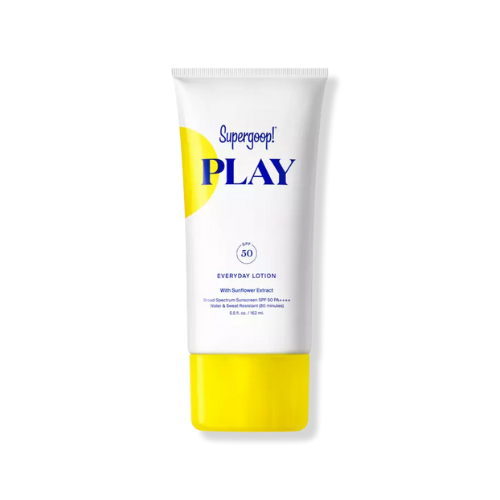
BEST OVERALL
Supergoop Play Everyday SPF 50
Buy now at supergoop
Buy Now at ulta
Supergoop! is a fan-favorite brand among dermatologists and regular sunscreen-wearers alike, and Play Everyday is a great option for, well, every day. It checks all the boxes, featuring broad-spectrum SPF 50 protection, water and sweat resistance for up to 80 minutes, and a lightweight yet hydrating formula enriched with good-for-your-skin ingredients like sunflower, rosemary, and rice bran extracts.
What Dr. Mikailov loves about this product — aside from the obvious, above — is that it comes in a variety of different sizes, including a hefty 18-ounce pump bottle. “The larger bottle reminds people to apply more of it for adequate protection,” he says. That, and it equates to a lower price-per-ounce, giving you all the more reason to slather it on.
Whether you invest in the pump bottle or spend under $15 for the on-the-go one-ounce tube, it’s reasonably priced, given its many protective and nourishing benefits.
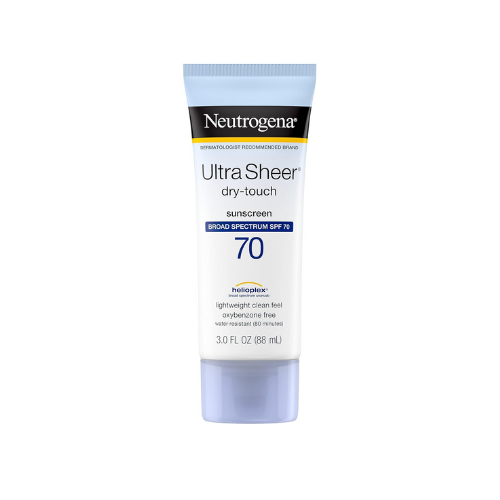
BEST VALUE
Neutrogena Ultra Sheer Dry-Touch Sunscreen
Buy Now On Amazon
As Dr. Kilgour states above, the price of a sunscreen isn’t indicative of its level of protection, but the overall texture and feel may vary the lower the price. That’s not the case with Neutrogena’s Ultra Sheer collection — in fact, he endorses its full lineup of sunscreen lotions, mists, and serums for both its affordability and its non-sensitizing, fragrance-free formulas.
The Dry-Touch Sunscreen SPF 70 is a lightweight lotion that, as the name implies, dries down invisible and residue-free for a barely-there feel. The chemical formula is oxybenzone-free, providing broad-spectrum protection and water resistance for up to 80 minutes. And considering you can grab a three-ounce tube for under $10, it’s a no-brainer.
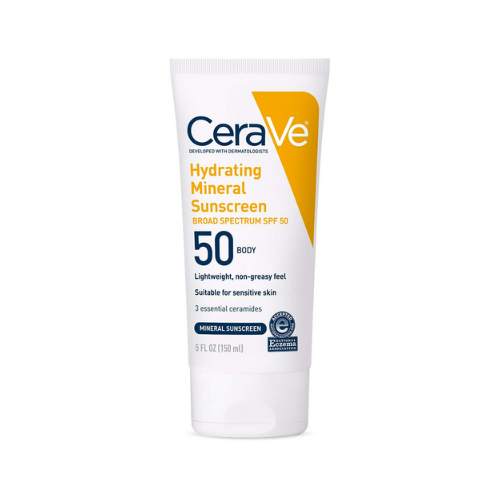
BEST FOR DRY SKIN
CeraVe Hydrating Mineral Sunscreen
Buy Now On Amazon
When your skin is dry, the last thing you want to slather on is a chalky, hard-to-spread SPF. That’s where this hydrating option from CeraVe — recommended by Dr. Mikailov, Dr. Kilgour, and Dr. Moy — comes in. “Some people can find mineral sunscreen a little drying, but this version is moisturizing and pretty easy to apply,” says Dr. Mikailov.
The non-greasy formula boasts broad-spectrum SPF 50 protection. It’s fortified with three essential ceramides for a deeply nourishing, skin barrier-boosting effect — a boon for those with dry and inflamed skin. It’s also recommended by the National Eczema Association, so you can trust that it won’t cause any irritation.
Like all CeraVe products, it comes with a drugstore price tag, which means it’s perfectly affordable sunscreen and moisturizer in one.
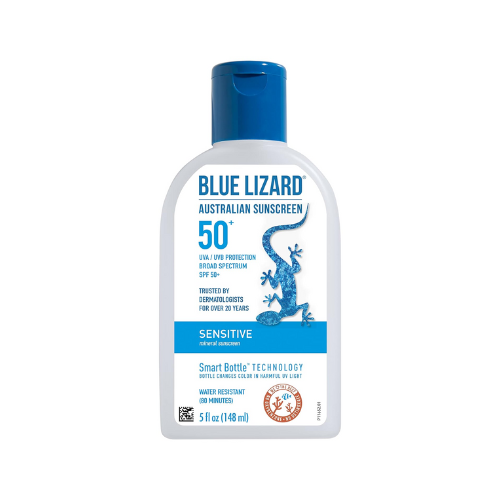
BEST FOR SENSITIVE SKIN
Blue Lizard Sensitive Mineral Sunscreen
Buy Now On Amazon
Sensitive skin types will benefit from using mineral sunscreens, as their active ingredients are less prone to causing skin reactions than those in chemical formulas. Aussie SPF brand Blue Lizard is a favorite among dermatologists for its non-irritating mineral formulas. Dr. Moy, in particular, is a fan of this formula, which is made specifically for those with finicky skin. “It rubs in clear, and it’s formulated with aloe vera, shea butter, sunflower seed oil, and vitamin E” — all ingredients famed for soothing, nourishing, and protecting easily aggravated skin.
But possibly the coolest feature is that the packaging contains Smart Bottle Technology, changing color when left out in harmful UV light — a good reminder to reapply and put away safely in your bag. Moreover, it’s priced very reasonably and is certified reef-safe. What’s not to love?
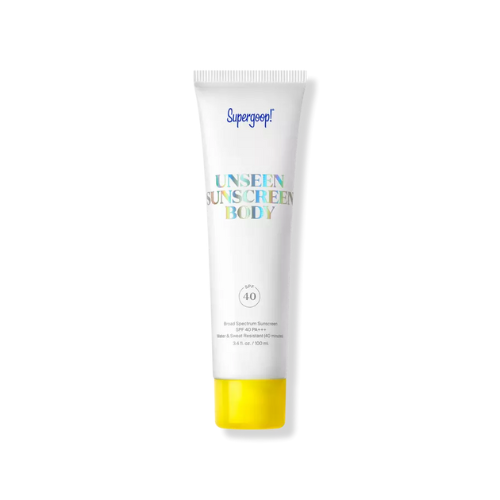
BEST SHEER
Supergoop! Unseen Body
Buy at supergoop
Buy Now at ULTA
Supergoop!’s Unseen Body sunscreen comes endorsed by Dr. Kilgour, Dr. Moy, and Dr. Mikailov due to the fact that it’s virtually undetectable. The gel formula is 100% invisible, weightless, and scentless, which is why it’s (unsurprisingly) reached cult-favorite status. “It’s the only sunscreen I’ve been able to convince my husband to use consistently,” says Dr. Kilgour.
Invisibility aside, it boasts broad-spectrum SPF 40 protection, is water-resistant for up to 40 minutes, and has a fast-absorbing formula that glides across the skin beautifully. “People find this one easy to apply every day,” notes Dr. Mikailov. It also leaves behind a smooth, velvety finish that’s surprisingly nourishing, given its barely-there effect.
This one is pricier than most on this list, but if you consider yourself a sunscreen hater, this is one you’ll actually enjoy wearing (promise).
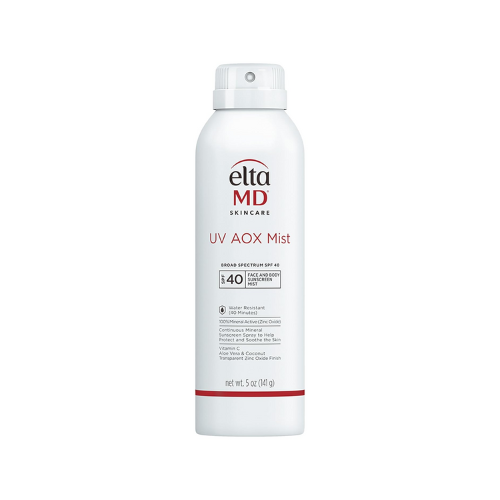
BEST SPRAY-ON
EltaMD AOX Mist
Buy Now On Amazon
Sunscreen mists are somewhat polarizing. Beloved by many for the ease of application, most dermatologists will argue that they make accurate coverage difficult, and you may inhale more of it than actually ends up on your body. “And while aerosols have been reformulated to remove the potentially harmful ingredient benzene, they’re still unpleasant to inhale,” adds Dr. Cohen.
But not all mists are created equal, and if you want to go the spray-on route, this SPF 40 option from dermatologist-trusted brand EltaMD is one to try. For starters, it has all the things you want from a sunscreen. “It’s lightweight, water-resistant, and has broad-spectrum protection,” says Dr. Ostad. What’s more, it uses air rather than chemical propellants, making it much safer than your average spray-on formula. “EltaMD pioneered this new type of mist, which is not an aerosol, but rather uses ‘bag on valve technology’ — it sprays whether pointed up or down and doesn’t have that aerosol smell,” explains Dr. Cohen, adding that because it’s oil-free, it’s also a great option for those with oily or acne-prone skin.
Of course, you’ll need to apply it properly to be fully effective (more on that below), but the formula’s white-to-clear technology makes it easy to not miss a spot. It’s one of the more expensive products on this list, but if you’re seeking a safe, healthy formula with the convenience of a mist, this is by far the best out there.
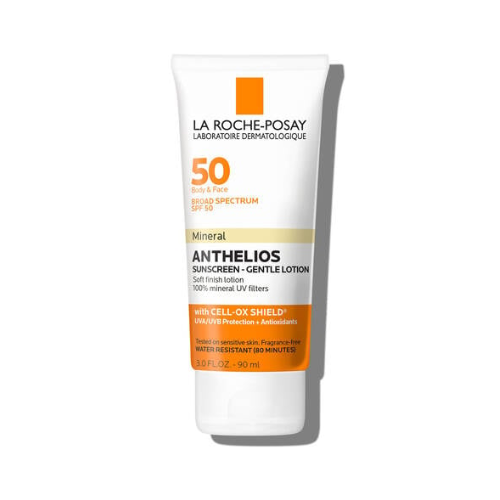
BEST MINERAL
La Roche-Posay Anthelios Gentle Lotion Mineral Sunscreen SPF 50
Buy Now On Amazon
Mineral formulas sit on top of the skin rather than absorb like chemical formulas. For this reason, dermatologists tend to favor them because they’re safe for sensitive skin types and children alike. This gentle lotion from La Roche-Posay is formulated with the brand’s Cell-Ox Shield technology, which provides broad-spectrum protection and is enhanced with antioxidants to fight free radical damage.
Recommended by the Skin Cancer Foundation, Dr. Moy considers it one of her personal favorites, noting that it’s the formula she uses for her baby. “It’s a great family choice because you can use it for babies and adults,” she says. It also has a great texture and finish despite using 100% mineral sun-blockers. “It feels soft and hydrating, spreads easily, and dries down to a smooth finish.”
It costs less than $30 for three ounces, which means it’s more affordable than most luxury formulas but pricier than the average drugstore option. But considering that it’s formulated for both the body and the face, you’re getting great value per tube.
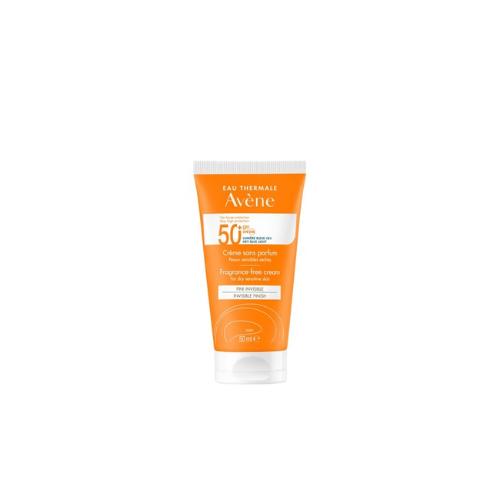
BEST CHEMICAL
Avène Sun Very High Protection Cream
Buy Now
Chemical formulas absorb into the skin rather than sit on top like mineral formulas that use zinc or titanium oxide. While the safety of some chemical blockers has been questioned in the past, most of the most common ingredients used today are deemed safe — and there are plenty of advanced, newly developed blockers used in sunscreens from Europe, Asia, Australia, and even Canada.
Dr. Kilgour recommends this formula from French pharmacy favorite Avène (as well as the rest of its Invisible Finish range) because it contains a new sun-blocking ingredient called TriAsorb. “Only available overseas, it’s the newest sunscreen filter that protects not only against UVA and UVB but also high-energy visible light, or blue light,” he says. It also contains moisturizing glycerin, protective vitamin E, and the brand’s skin-soothing Thermal Spring Water.
Luckily, the internet makes it easy to shop for these products without the added cost of airfare, so at under $30, consider this one a steal.
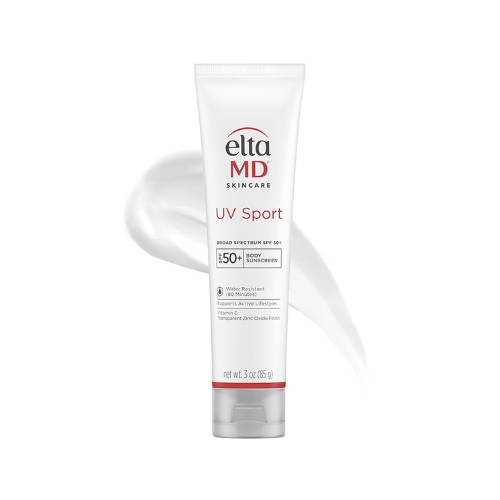
BEST ACTIVE
EltaMD UV Sport Body Sunscreen
Buy Now On Amazon
Whether going for a swim, running a marathon, or doing some light yard work, it’s important to use a water-resistant SPF if you’ll be active, as even the slightest amount of sweat can cause sunscreen to break down. Dr. Ostad recommends this sport formula from EltaMD because it provides up to 80 minutes of sweat and water resistance and uses the mineral blocker zinc oxide to provide broad-spectrum protection against UVA and UVB rays. The formula also includes two chemical blockers, octinoxate and octisalate, making for a hybrid formula that melts into the skin beautifully.
Like all EltaMD products, it has a higher price tag, but it’s a full-body formula you can use on your face, too. The brand claims it won’t rinse off in water or drip into your eyes while you sweat (and if you’ve ever been unfortunate enough to get sunscreen in your eyes, you’ll know this is a major plus).
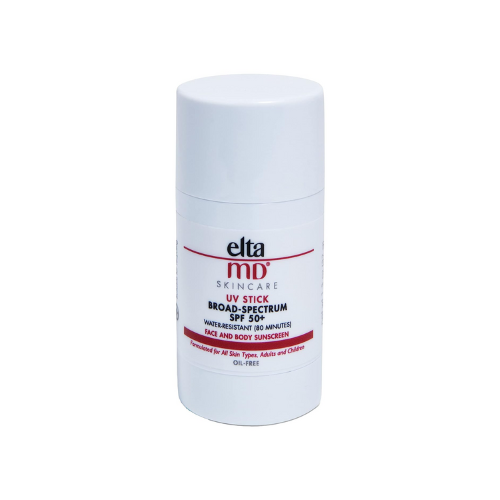
BEST FOR ON-THE-GO
EltaMD UV Stick Broad-Spectrum SPF50+
Buy Now On Amazon
Stick formulas aren’t recommended for applying sunscreen to your entire body, but they’re great for reapplication on exposed areas throughout the day. Enter this SPF 50+ face and body stick, another derm-recommended option from EltaMD. “This stick is great to keep in your car for sunscreen on the go — my patients use this one all the time on their face and hands when it may be cloudy that morning but bright later in the day,” says Dr. Bovenzi
Easy to apply and mess-free, the water-resistant mineral formula provides broad-spectrum protection with added antioxidants to further guard against blue light. Just as important, it doesn’t leave behind any white cast or residue. It’s a bit costly for a stick, but remember that this isn’t a product you’ll be applying head-to-toe on a daily basis, so it’ll last you quite a while.
Frequently Asked Questions About Body Sunscreens
Which is Better, a Mineral or Chemical Formula?
There are two types of sunscreens: chemical formulas and mineral formulas. “Chemical sunscreens penetrate your skin and offer protection by absorbing the damaging UV rays before they can do any harm,” explains Dr. Ostad. “These include ingredients like oxybenzone, avobenzone, octisalate, octocrylene, homosalate, and octinoxate. Mineral sunscreens act like a shield, forming a physical barrier on the skin’s surface to block and scatter harmful rays. These include ingredients such as zinc oxide and titanium dioxide.”
Is one better than the other? Not necessarily, but each has its pros and cons. Many dermatologists consider mineral formulas more effective than chemical, Dr. Ostad included, but they’re also more prone to leaving behind a white cast, which may deter people from wearing them. “They also tend to be thicker and take more effort to rub in,” adds Dr. Bovenzi. “They’re preferred for very young children and pregnant women, as they have less risk of interfering with any endocrine function, which can potentially happen with chemical sunscreens.”
On the plus side, chemical sunscreens can be more resistant to water and sweat since they’re absorbed by the outer layers of the skin, notes Dr. Bovenzi, adding that they also tend to have a thinner feel, making them easier to apply. However, they’re also more likely to trigger allergic reactions in those with sensitive or easily irritated skin.
All things considered, choose a sunscreen you enjoy that works well with your skin, regardless of formula type.
Is There a Trick to Applying (and Reapplying) Body Sunscreen?
For starters, sunscreen should be applied whenever you’re out in the sun — not only on beach days or before a sunny summer hike. And while application is intuitive, there are best practices to follow. “Apply 15-30 minutes before going outdoors,” says Dr. Moy. “Most adults need a shot glass full of sunscreen for the body — this includes the top of feet, back of hands, tips of ears, and neck.” Creams are generally recommended as they’re easier to apply all over the body, but some prefer the convenience of a spray. If you go the spray route, be sure that each area of the body is sprayed over at least three times, says Dr. Mikailov. “Better yet, use your hands to rub the SPF in. This helps ensure that no body parts are missed.”
Where most people tend to fall off is reapplication — an important step of any sun protection routine that often goes neglected. “Sunscreens are tested for two-hour efficacy, so they need to be reapplied every two hours, at minimum, but more frequently if swimming, sweating, or toweling off,” says Dr. Cohen. Reapplication can be especially difficult when you’re on the go, so Dr. Bovenzi recommends keeping multiple sunscreen products in your home, office, bag, and car. “This makes it easy to apply at a moment’s notice.”
And if you’re really bad at remembering to reapply, consider importing your sunscreen. “What most people don’t know is that the best sunscreens aren’t available in the U.S. due to archaic FDA regulations,” says Dr. Kilgour. “New filters such as Tinosorbm, Mexoryl, and TriAsorb are freely available in Canada, Europe, Asia, and Australia. These are much more photostable, lasting longer without the need to reapply as frequently.”
Can I Wear Body Sunscreen On My Face?
You can, but you may not want to. “Any sunscreen is better than no sunscreen, but there are special formulations for the face that often include a moisturizer and a thinner consistency, decreasing the risk of blocking your pores and causing acne breakouts,” says Dr. Bovenzi. “It’s best to have a separate, face-specific sunscreen.” But in a pinch? A good body sunscreen will still offer the protection your face needs.
Proceed to Checkout
More Top Deals from SPY
Best of SPY
